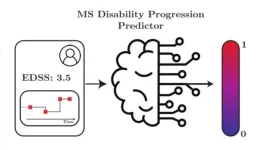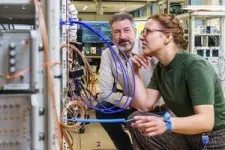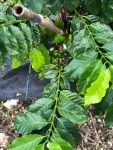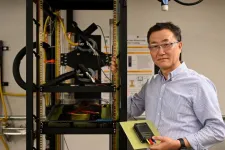(Press-News.org) Machine learning models can reliably inform clinicians about the disability progression of multiple sclerosis, according to a new study published this week in the open-access journal PLOS Digital Health by Edward De Brouwer of KU Leuven, Belgium, and colleagues.
Multiple sclerosis (MS) is a chronic progressive autoimmune disease that leads to severe disability over time through a complex pattern of progression, recovery, and relapse. Its global prevalence has increased by more than 30% over the last decade. Yet there are few tools that can predict the progression of MS to help clinicians and patients make life planning and treatment decision-making.
In the new study, De Brouwer and colleagues used data on 15,240 adults with at least three years of MS history who were being treated at 146 MS centers in 40 countries. Data on two years of each patient’s disease progression was used to train state-of-the-art machine learning models to predict the probability of disease progression over the subsequent months and years. The models were trained and validated using strict clinical guidelines, promoting applicability of the models in clinical practice. While individual models varied in performance across different patient subgroups, the models had an average area under the ROC curve (ROC-AUC) of 0.71 ± 0.01. The study found that the history of disability progression was more predictive for future disability progression than treatment or relapse history.
The authors conclude that the models developed in the study have the potential to greatly enhance planning for individuals with MS and could be evaluated in a clinical impact study.
De Brouwer adds: “Using the clinical history of more than 15,000 people with multiple sclerosis, we trained a machine learning model capable of reliably predicting the probability of disability progression in the next two years. The model only uses routinely collected clinical variables, which makes it widely applicable. Our rigorous benchmarking and external validation support the vast potential of machine learning models for helping patients planning their lives and clinicians optimizing treatment strategies.”
############
In your coverage, please use this URL to provide access to the freely available article in PLOS Digital Health: https://journals.plos.org/digitalhealth/article?id=10.1371/journal.pdig.0000533
Citation: De Brouwer E, Becker T, Werthen-Brabants L, Dewulf P, Iliadis D, Dekeyser C, et al. (2024) Machine-learning-based prediction of disability progression in multiple sclerosis: An observational, international, multi-center study. PLOS Digit Health 3(7): e0000533. https://doi.org/10.1371/journal.pdig.0000533
Author Countries: Argentina, Australia, Belgium, Canada, Czech Republic, Greece, Hungary, Italy, Ireland, Kuwait, Lebanon, Malta, The Netherlands, Oman, Spain, Saudi Arabia, Switzerland, Turkey, Romania, United Kingdom, United States
Funding: This study was funded by the Research Foundation Flanders (FWO) and the Flemish government through the Onderzoeksprogramma Artificiele Intelligentie (AI) Vlaanderen program (https://www.flandersairesearch.be/en). This funding was awarded to YM, LB, TD, DD, WW, and BDB and funded EBD, TB, LWB, PD, DI, MS, YM, LB, TD, DD, WW, and BDB. EDB was also concomitantly funded by a FWO-SB fellowship (1S98821N - https://fwo.be). The funders had no role in study design, data collection and analysis, decision to publish, or preparation of the manuscript.
END
Novel human lung organoids can form lifelike models for tuberculosis infection, and might be used to test efficacy of anti-TB drugs.
####
Article URL: http://journals.plos.org/plospathogens/article?id=10.1371/journal. ppat.1012295
Article Title: Advances in an In Vitro Tuberculosis Infection Model Using Human Lung Organoids for Host-Directed Therapies
Author Countries: Republic of Korea
Funding: This research was supported by the Korea National Institutes of Health (NIH) (No. 2021-ER2001-00) awarded to E.M.K., the Korea Institute of Toxicology, Republic of Korea (No. 1711195891) awarded to E.M.K., the Korea Environment Industry & Technology ...
Researchers at QuTech developed somersaulting spin qubits for universal quantum logic. This achievement may enable efficient control of large semiconductor qubit arrays. The research group published their demonstration of hopping spins in Nature Communications and their work on somersaulting spins in Science.
In 1998, Loss and DiVincenzo published the seminal work ‘quantum computation with quantum dots’. In their original work, hopping of spins was proposed as a basis for qubit logic, but an experimental implementation has remained lacking. After more than 20 years, experiments have caught up with theory. Researchers ...
Professor Morawska, director of THRIVE, from QUT’s School of School of Earth and Atmospheric Sciences said the rapid global spread of Covid-19 had soon made it clear the world was unprepared to respond appropriately.
“In the early days of the pandemic the World Health Organisation and many national health authorities claimed the virus was ‘not in the air’ but rather present in large quantities on surfaces. This led to a misconception about how the virus was transmitted,” ...
Crave that cup of coffee in the morning? Globally, consumers drink more than 2.2 billion cups daily. Someone grows all that joe: More than 100 million farmers worldwide produce coffee.
Coffee beans consumed across the globe come from two species: Coffea arabica and Coffea canephora, also known as Robusta (or Conilon) coffee. Historically, coffee drinkers prefer Arabica beans for their specific flavor and aroma, said Felipe Ferrao, a University of Florida research assistant scientist in horticultural sciences.
But by 2050, about 80% of Arabica production is predicted to decrease because of climate change. So, Ferrao and colleagues from France (RD2 Vision) and Brazil (Incaper ...
COLUMBUS, Ohio – A noninvasive colorectal cancer screening test that can be done at home could reduce the risk of colorectal cancer death by 33%, according to a new study published in JAMA Network Open. This is the first study to evaluate this tool’s effectiveness in specific racial groups.
For this study, researchers at The Ohio State University Comprehensive Cancer Center – Arthur G. James Cancer Hospital and the Richard J. Solove Research Institute (OSUCCC – James), and Kaiser Permanente evaluated data from nearly 11,000 patients who underwent at-home FIT (fecal immunochemical testing) among ...
Artificial intelligence (AI) is hot right now. Also hot: the data centers that power the technology. And keeping those centers cool requires a tremendous amount of energy.
The problem is only going to grow as high-powered AI-based computers and devices become commonplace. That’s why University of Missouri researcher Chanwoo Park is devising a new type of cooling system that promises to dramatically reduce energy demands.
“Cooling and chip manufacturing go hand-in-hand,” said Park, a professor of mechanical and aerospace engineering in the Mizzou College of Engineering. “Without proper cooling, components overheat and fail. Energy-efficient data centers will be key ...
Scientists have discovered that electrical currents may make Natural Killer (NK) cells – our very own cancer-killing immune cells – even better killers, which could have significant implications for treating some cancers.
The scientists found that Tumour Treating Fields (TTF) in the laboratory (which mimic exposure of brain tumours to electric currents via a simple hat worn by patients) evoked an even more deadly response from NK cells. They hope their promising findings may open the door to new combined therapies for people living with certain brain tumours, such as glioblastoma.
Glioblastoma is an aggressive, common ...
Most (83%) suicide deaths were among men
Firearms were the most frequently used weapon (59%)
Among those who died by suicide, 20% had been diagnosed with depression; only 14.1% of them were receiving treatment
CHICAGO --- Nearly 20% of suicides in Illinois between 2020 and 2021 were among people 65 years and older, according to recently released data from Northwestern University Feinberg School of Medicine. The suicides disproportionately affected white men between the ages of 65 and 74 years, with ...
Scientists for decades have attempted to learn more about the complex and mysterious chain of events by which tiny droplets in clouds grow large enough to begin falling toward the ground. Better understanding this process, known as the “rain formation bottleneck,” is fundamental to improving computer model simulations of weather and climate and ultimately generating better forecasts.
Now a research team led by scientists at the U.S. National Science Foundation National Center for Atmospheric Research (NSF NCAR) ...
PHILADELPHIA – There are many important reasons for keeping cuts and sores clean, but new research from the Perelman School of Medicine at the University of Pennsylvania shows that a certain bug, Alcaligenes faecalis (A. faecalis), can facilitate healing of hard-to-treat wounds among people with diabetes. While there are many studies done on potentially harmful bacteria in wounds, the researchers discovered that A. faecalis, a bacterium found in many types of chronic wounds, actually boosts healing of diabetic wounds. The researchers found that the beneficial bacterium can promote ...





